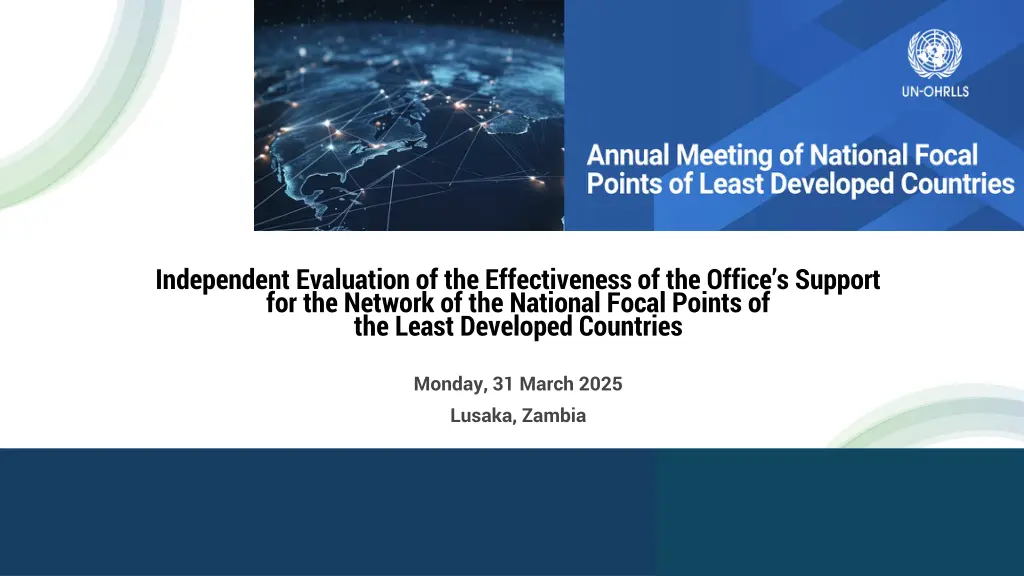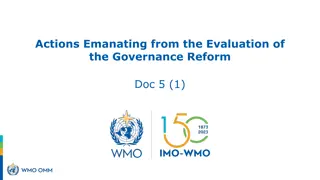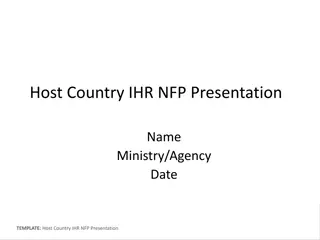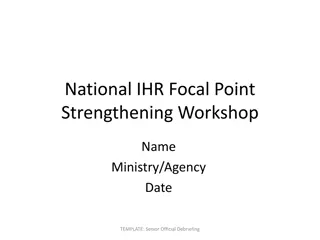
Evaluation of National Focal Points Support Network
This independent evaluation assesses the effectiveness of the office's support for the network of National Focal Points of the Least Developed Countries. The evaluation aims to enhance support for NFPs, optimize institutional arrangements, improve accountability, and enhance resource efficiency. Findings indicate the relevance, capacity development, and peer learning facilitated by the NFPs network.
Download Presentation

Please find below an Image/Link to download the presentation.
The content on the website is provided AS IS for your information and personal use only. It may not be sold, licensed, or shared on other websites without obtaining consent from the author. If you encounter any issues during the download, it is possible that the publisher has removed the file from their server.
You are allowed to download the files provided on this website for personal or commercial use, subject to the condition that they are used lawfully. All files are the property of their respective owners.
The content on the website is provided AS IS for your information and personal use only. It may not be sold, licensed, or shared on other websites without obtaining consent from the author.
E N D
Presentation Transcript
Independent Evaluation of the Effectiveness of the Offices Support for the Network of the National Focal Points of the Least Developed Countries Monday, 31 March 2025 Lusaka, Zambia (Research Title here)
Background The Network of National Focal Points (NFPs) of LDCs was established after the adoption of the Brussels Programme of Action for LDCs in 2001. Nominated by respective governments, the NFPs are mandated to facilitate the effective implementation, follow-up and monitoring of the PoAs at the national level. To date, 39 out of 44 LDCs have nominated NFPs. In 2024, UN-OHRLLS conducted the first comprehensive external evaluation of Office s support to the NFP network. (Research Title here) (Research Title here) (Researcher)
Goal and Objectives of the Evaluation Enhance the support provided to the LDCs National Focal Points and better tailor programmes to boost the capacity of NFPs Optimize the institutional arrangements for effective implementation of the DPoA Enhance the accountability of the Office Help improve the efficiency in resource allocation and usage (Research Title here) (Research Title here) (Researcher)
Evaluation Scope, Questions and Approach Focused on the relevance, coherence, effectiveness, efficiency, sustainability, and potential impact of the NFPs network from 2019 to 2024, as well as sustainability of the activities and initiatives and their underlying strategies. Key data collection methods included desk reviews of UN-OHRLLS publications and reports, survey questionnaires, and semi- structured interviews. NFPs in 40 LDCs, and UN entities (OHRLLS, IACG members, RCOs), national partners, and selected development partners (167 people) (Research Title here) (Research Title here) (Researcher)
Evaluation Scope, Questions and Approach Survey questionnaires were sent to national focal points from 22 October to 18 November 2024. A questionnaire in French was also sent to Francophone LDCs. The survey was responded by 27 people representing 22 LDCs. The response rates both in terms of people s sample size and LDCs sample size are around 55%. 37 partners and stakeholders responded with a response rate of 23%. Interviewed 26 stakeholders Limitations such as remote data collection and survey fatigue (Research Title here) (Research Title here) (Researcher)
Findings: 1. RELEVANCE The NFPs network provides a critical platform for capacity development, peer learning, and stakeholder engagement to support the implementation and monitoring of the Programme of Action. The NFPs network serves as a bridge between the implementation of national and international development agendas. 93% of NFPs affirmed the network s relevance, 94% indicated it meets their informational needs, its activities e.g. annual meetings, capacity-building workshops, and tailored guidance have been widely endorsed. (Research Title here) (Research Title here) (Researcher)
Findings: 1. RELEVANCE UN-OHRLLS has devised mechanisms and approaches and delivered a range of products which have been highly relevant to the NFPs network for the implementation and monitoring of the DPoA. - Annual meetings and capacity building workshops - Direct engagement with NFPs and Resident Coordinators - Country-specific guidance on transition strategies However, gaps in systematic needs assessments, continuity of engagement, and the absence of a structured, long-term strategy were noted. (Research Title here) (Research Title here) (Researcher)
Findings: 2. COHERENCE The NFPs network aligns closely with UN-OHRLLS mandate to support the implementation of the Doha Programme of Action and other global policy frameworks. It provides a vital platform for fostering knowledge sharing, monitoring progress, and facilitating collaboration to address the structural challenges of LDCs while advancing the DPoA and 2030 Agenda at local, national, and regional levels. (Research Title here) (Research Title here) (Researcher)
Findings: 2. COHERENCE The network has consistently integrated PoA objectives into its meetings and activities, demonstrating coherence with UN-OHRLLS priorities. However, inconsistent participation of NFPs in activities organized by OHRLLS and variable roles of NFPs across national contexts hinder the network s potential. Engagement with the NFPs network was occasional. The potential of the NFPs network is limited by a lack of formal frameworks for more regular coordination. (Research Title here) (Research Title here) (Researcher)
Findings: 3. EFFICIENCY UN-OHRLLS has been highly efficient in using its human and institutional resources in support of the NFP network. Resources channelled to the network have increased since 2020. Both regular and extrabudgetary financial resources dedicated to the NFPs network for the period 2019-2024 . The budget used for the NFPs network during 2019-2024 accounted for 18 % from the regular budget and for 82% from donors including Denmark, Norway, Qatar and T rkiye. (Research Title here) The budget for the NFPs network has been largely committed to covering travel costs, (Research Title here) (Researcher) including financial support for their participation in the meetings.
Findings: 3. EFFICIENCY However, financial resources remain insufficient at the national level for NFPs to fully perform their roles, and the absence of a more diverse, representative and robust governance structure, strategic plans, and consistent communication practices has constrained the network's operational efficiency. External partners have engaged with the NFPs network through activities organized by UN-OHRLLS but have rarely utilized the network directly for collaboration. The NFPs network was not visible and therefore little known by partners. (Research Title here) (Research Title here) (Researcher)
Findings: 4. EFFECTIVENESS UN-OHRLLS has been significantly successful in supporting the capacities of NFPs and advancing the implementation of the Programme of Action and the SDGs. The annual meetings, workshops, and publications organized by UN-OHRLLS were highly rated withsignificant improvements in knowledge-sharing and peer-learning. Over 85% of surveyed NFPs reported enhanced engagement capabilities with governments, UN entities, and regional organizations, and the network has facilitated the integration of the PoA into national development plans in several countries. (Research Title here) (Research Title here) (Researcher)
Findings: 4. EFFECTIVENESS The effectiveness of the NFPs network has been mixed across contexts. The level of engagement of NFPs in policy-making and programming is influenced by a range of institutional and contextual factors linked to their position in the national public administration. Engagement varies significantly with NFPs in fragile or conflict-affected countries facing greater challenges. Knowledge-sharing mechanisms outside meetings remain limited, and the absence of a structured community of practice and follow-up mechanisms (Research Title here) hinders sustained collaboration. Reporting efforts and overlapping frameworks further complicate NFPs' responsibilities. (Research Title here) (Researcher)
Findings 5. IMPACT The NFPs network has a strong likelihood of generating positive long-term impacts. 72% of NFPs affirmed that the network has contributed to sustainable development, implementation of the PoA and accelerated LDC graduation. The NFPs network has fostered knowledge-sharing, peer learning, and institutional visibility, enabling NFPs to better engage with governments, UN entities, and regional bodies. Limitations remain in its influence on global policymaking, resource mobilization, and integrated reporting systems. (Research Title here) The NFPs network s contribution to gender equality and the empowerment of vulnerable (Research Title here) (Researcher) groups has been relatively limited, indirect, and implicit, rather than a central focus.
Findings 6. SUSTAINABILITY 96% of NFPs reported that the knowledge, skills, and partnerships gained through the network are likely to have lasting benefits for their institutions. Challenges were identified that could impact the sustainability of the network s impact include. The turnover of NFPs leads to a loss of knowledge and continuity. The lack of a knowledge management platform and vision jointly with limited resources for the NFPs to function and DPoA implementation were cited as (Research Title here) areas requiring attention. (Research Title here) (Researcher)
Best Practices & Lessons Learned Best Practices Gambia disseminates information to relevant national stakeholders upon returning from the NFPs network meetings and high-level meetings. The UN RCO in Tanzania works collectively and coordinates with national focal points for the relevant agendas, including the DPoA, the Agenda 2063 of African Union The NFPs network enables LDCs to collectively address shared challenges and advocate for common priorities. The Solomon Islands pointed out that the network creates a sense of family, strengthening collaboration and trust among (Research Title here) members. (Research Title here) (Researcher)
Best Practices & Lessons Learned Lessons Learned The use of modern tools and platforms for collaboration can be a key enabler of the NFPs network. Resource mobilization remains a significant challenge for many NFPs. Capacity-building is critical to the effective functioning of the national focal points. Networks and initiatives must prioritize activities that deliver tangible and measurable outcomes. (Research Title here) (Research Title here) (Researcher)
Recommendations Immediate Objectives: Recommendation 1: UN-OHRLLS should further formalise the NFPs network, enhance its value, and seek to mobilize resources to expand its effectiveness and impact. - Clarify roles and responsibilities - Develop a multi-year work plan - Extend the duration of annual meetings of the NFPs network - Consult with NFPs and partners, as appropriate, when planning activities for the NFPs network - Enhance learning platforms - Increase visibility and accessibility - Mobilize resources (Research Title here) (Research Title here) (Researcher)
Recommendations Medium-term Objectives: Recommendation 2: UN-OHRLLS should enhance multi-stakeholder engagement in the activities of the NFPs network. - Systematize needs assessment -Strengthen the governance of the NFPs network -Enhance peer-learning mechanisms - Leverage the NFPs network to advocate for the specific needs of LDCs - Leverage UN and external support - Support NFPs in mobilizing resources to mainstream the DPoA in National Development Plans (Research Title here) (Research Title here) (Researcher)
Recommendations Long-term Objectives: Recommendation 3: UN-OHRLLS should consider expanding the support and services provided to the NFPs network subject to availability of resources. - Create a Community of Practice - Support knowledge management (Research Title here) (Research Title here) (Researcher)
Thank you! (Research Title here) (Research Title here) (Researcher)






















